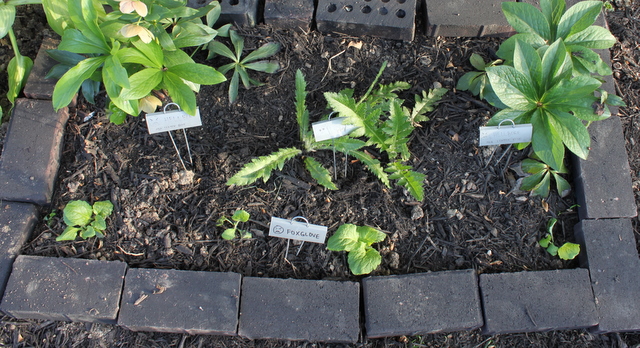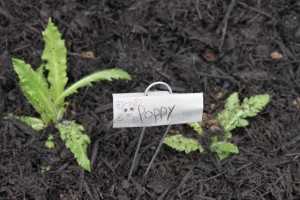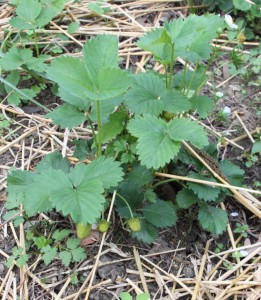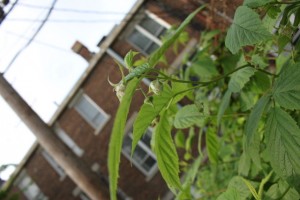We grow forty seven varieties of edible, nutrient rich fruits and vegetables in the backyard. Now we're also growing the opposite: plants that can kill.
 In a bed bordered by black bricks, we planted a deadly garden of foxglove, hellebore, and poppies. These are nestled in among black mulch and labeled with stakes carrying the Mr. Yuck symbol. Alex has plans to create some skull and cross bones decorations too.
In a bed bordered by black bricks, we planted a deadly garden of foxglove, hellebore, and poppies. These are nestled in among black mulch and labeled with stakes carrying the Mr. Yuck symbol. Alex has plans to create some skull and cross bones decorations too.
How Deadly?
Foxglove, or digitalis, is an extremely poisonous flower. When dosed in proper concentration it can temper irregular heartbeats. This property is also how foxglove can kill: it stops the heart cold.
 Hellebore is also known as Lenten Rose. Sometimes used to treat a variety of symptoms, all parts of hellebore are toxic except the roots. Some historians believe that Alexander the Great died of an overdose of hellebore.
Hellebore is also known as Lenten Rose. Sometimes used to treat a variety of symptoms, all parts of hellebore are toxic except the roots. Some historians believe that Alexander the Great died of an overdose of hellebore.
The poppy flower bud contains opium, a medicinal extract, recreational drug, and not in-frequent cause of lethal overdose. Of course, we can collect the poppy seeds to consume safely.
The book Wicked Plants by Amy Stewart profiles dozens of poisonous species found around the world, should you want to learn more.
Why introduce toxins to the garden?
Our garden is mostly created for our own vegetable consumption. With frequent visitors and open houses, the backyard is also an educational project. We hope to inspire people to better know their food and consider their relationship to nature.
Paying attention to nature means knowing the difference between edible, inedible, and dangerous plants. Especially as all the plants in our deadly garden are commonly used in landscape, settling them apart in an defined bed provides an important learning environment for children. There is much history in each of our deadly garden species, including how natives used them and how modern medicine is derived from plants.
 Another reason to plant a deadly garden is for the seductive beauty. Foxglove are some of my favorite flowers, Lenten rose is one of the first blooms in the yard, and poppies are simply spectacular. The contradiction of a lethal yet gorgeous garden bed pleases us.
Another reason to plant a deadly garden is for the seductive beauty. Foxglove are some of my favorite flowers, Lenten rose is one of the first blooms in the yard, and poppies are simply spectacular. The contradiction of a lethal yet gorgeous garden bed pleases us.
If ever zombies attack or the world otherwise ends, it might be useful to have strong medicines available in the backyard. This isn't much of a concern, of course, but we do consider knowing the 'enemy' plants as useful a skill as knowing how to grow and prepare nutritious edibles.
A garden is nothing if not an exploration of life and death. We give life to the plants we want to grow while pulling weeds from their roots. Allowing poisonous flowers to exist is just another way to highlight the true nature of a garden: a plot of land carefully controlled for purposeful results.
Added to Simple Lives Thursday 43.

 concord grapes, montmorency cherries
concord grapes, montmorency cherries











